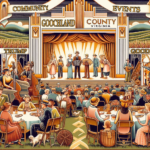Submitted by: Robert Cook
Each year, when I teach my students about how we choose the president through the Electoral College, several students will question why we use it. They’ll say “a popular vote is simpler” or “Whoever gets the most votes has the most support, so they should be president”. They often find this weighted system deciding between two candidates as extra steps that allow for ignoring the national popular will. While on the surface, the Electoral College looks that way, the problem is that we don’t implement it the way the founders’ envisioned. A brief look at what Madison and Hamilton state in the Federalist papers addresses these questions, and actually shifts the Electoral College’s purpose from a way to convert popular votes to a system of elections that creates a trusted body of individuals who then determine who should be President. Madison explained the reasoning for why electors are weighted by state. In Federalist 39, he explains that the Electoral College is a compromise between popular and states centered systems to decide the President. Similar to the process for making laws. The House is based on population, so bills passing the House are presumed to be approved by the people. The Senate holds states equally, so bills passing the Senate are presumed to be approved by the States. Madison states the Electoral College is a hybrid of these methods.
“The immediate election of the President is to be made by the States in their political characters. The votes allotted to them are in a compound ratio, which considers them partly as distinct and coequal societies, partly as unequal members of the same society.…From this aspect of the government it appears to be of a mixed character, presenting at least as many federal as national features.”
From this, we can determine Madison proposed the Electoral College as a means of choosing the President in a way that both respects the will of the people while considering the will of the States. Multiple interests, not just the popular will, are considered, as the President plays a role in decisions that will affect the people as a whole and the functioning of the States.
Hamilton approaches the Electoral College from a different angle. He notes that there are several benefits of an Electoral College. First, by having an election where trusted individuals are chosen, it changes the purpose of why people go to the polls from who would make a good President, to who in my community is trustworthy and discerning. Second, having a smaller body that is elected on the premise of trust, will result in more effective decision making than the chaos of a widespread national popular discussion.
Hamilton’s third point, however, is his strongest argument against a popular vote. “The choice of several to form an intermediate body of electors will be much less apt to convulse the community with any extraordinary or violent movements than the choice of one who was himself to be the final object of the public wishes.” Hamilton argues that an Electoral College would be more effective against polarization in our presidential elections. If people voted for who they trusted as electors, and not directly for presidential candidates, this would diffuse most of the political anxiety and hostility that surrounds our elections.
With that said, the entity that we know as the Electoral College is inconsistent with Hamilton’s explanation. 48 of the 50 states designate their electoral votes as winner-take-all. In Virginia, the
votes in Fairfax and Richmond overrule the will of the rest of the state for 100% of Virginia’s Electoral votes. Every state lists the parties’ candidates on the ballot, without listing who the parties chose as Electors. Most voters do not know who will represent them in the Electoral College. Because states orient our presidential election around the candidates, instead of the Electors, parties logically fill the necessary role of choosing their preferred slates of electors.
This is why so many people do not actually understand the Electoral College. What was intended to be a locally oriented and trust-based form of representation became a twisted version of a state level popular vote presenting two bifurcating options. The people do not choose electors they trust, but rather cast a vote for a slate of electors that most do not know. The votes of the minority party in a state are not considered, as a one vote difference decides the electoral slate for entire states. In 2016, 45% of Virginia’s voters were ignored as all 13 electoral votes went to Hillary Clinton. If split proportionally, Trump should have received 5 or 6 of those Electors.
With that said, what would an Electoral College that reflects the founders’ vision look like? Madison’s view of considering both the people and the states would at least encourage electoral slates like Nebraska’s and Maine’s method of splitting electors based on congressional district voting outcomes. A system that reflects Hamilton’s vision would require more substantial reform. To avoid the problems that he notes with a “choice of one”, replacing the names of candidates on the ballot to the names of Electors would be necessary. This would result in Electors running for office publicly, much like any other political position, and making the case to the electorate that they are trustworthy and discerning enough to choose the right person to be President.
The Electoral College is vastly superior to a popular vote system. It considers both large and small states, and the views of more than just the urban portions of our population. However, the way it is currently executed is inconsistent with what our founding fathers envisioned. What was supposed to be a system rooted in local discernment and trust has become a series of statewide popular votes that ignores the will of most voters and hides from the public who makes the decisions in the Electoral College. As a result, it still has the problem a popular vote system has of pitting half of the nation against the other over two candidates. If we want our Electoral College to be better respected and understood we need an emergence of state laws that reflect a system consistent with the visions of both Madison and Hamilton.










